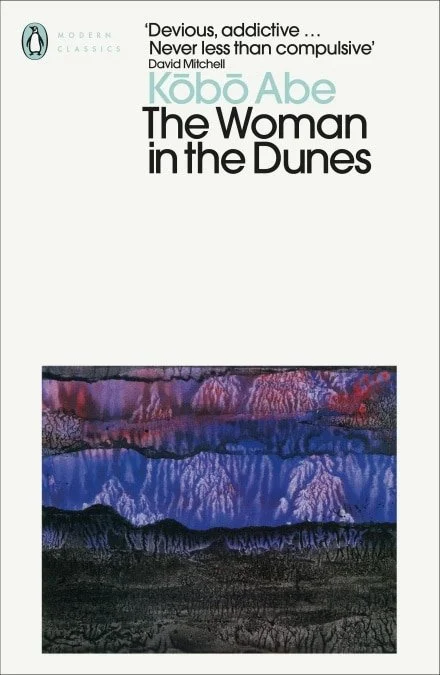Woman in the Dunes – Kōbō Abe
“Everything depends on the attitude one takes in a given situation.”
Magnetic. Surreal. Disturbingly beautiful.
I haven’t read a book like this in a very long time. From the first pages, it pulls you in like quicksand—you just want more and more, constantly wondering what will happen next. On the surface, it might feel like a story about captivity, maybe even Stockholm Syndrome. But to me, it’s more about what it means to find purpose in absurd, unbearable circumstances—and how easily a person can adapt to a life they once hated.
The main character is a man chasing significance. He wants to be remembered, to discover a rare insect that will earn him fame. That obsessive pursuit leads him to a remote village—and straight into a trap. He becomes a prisoner, sharing a house at the bottom of a sand pit with a woman who lost her family. His prison is built from the very thing he came to admire: sand. But this sand isn’t poetic or peaceful—it’s invasive, destructive, impossible to control.
“Lecz wszystko zależy od postawy, jaką człowiek przyjmuje w danej sytuacji.”
Everything depends on the attitude one takes in a given situation.
In this village, survival depends on communal effort. If you don’t shovel sand, your house collapses—and when your house collapses, your neighbor’s does too. It’s a clear metaphor for Japanese values around shared responsibility and the weight of societal expectations.
The man resists at first. He tries to escape again and again. But he also has needs—physical, emotional, existential. He begins to desire the woman who, in a way, helped trap him. At first he resents her, then he wants her, then he simply accepts her.
There’s a disturbing scene where the village elders offer them freedom—if they perform sex publicly. He forces her, desperate to escape. She fights back. Yet later, she forgives him, even feels pity for his despair. The emotional dynamics are twisted, but raw and human.
As time passes, the man realizes that no one is coming to rescue him. He told no one where he was going. He never sent that postcard to his partner. He has to admit: no one is looking for him.
So he adapts. He stops obsessing over escape and starts building a new kind of life. He finds purpose in learning how to draw water from the sand. When the woman gets sick and is taken to a hospital—giving him a chance to escape—he stays. He doesn’t run. Instead, he wants to perfect the water trap, to understand this place on his own terms.
“Na pewno, w pracy jest coś niezwykle ważnego dla człowieka, co pozwala mu znosić czas bezsensownie upływający.”
There is something deeply important in work that helps a person endure the meaningless passing of time.
This book asks uncomfortable questions:
What is freedom, really?
Is it the ability to go wherever you want? Or is it the power to find purpose, even when you’re stuck?
“Nim przyszedł tutaj… przez długi czas nie był w stanie nic na to odpowiedzieć. […] A czy można teraz stwierdzić bez wahania, że już przesycili się tą wolnością, która w ogóle nie wymaga od nich chodzenia?”
Before he came here… for a long time, he couldn’t answer that question. And now—can we really say with confidence that people aren’t already tired of the kind of freedom that demands nothing from them?
